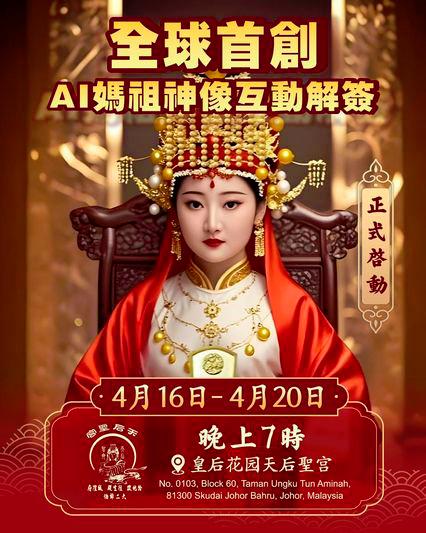A Taoist temple in Johor, Malaysia, has unveiled what it claims is the world’s first AI-powered Mazu statue, allowing worshippers to interact with the revered sea goddess through a digital interface.
Developed by local tech firm Aimazin, the AI Mazu appears on a screen as a serene woman dressed in traditional Chinese attire—her appearance reminiscent of a fuller-faced version of China actress Liu Yifei.
ALSO READ: Customer calls out restaurant for displaying AI generated images on food delivery app
Through voice interaction, devotees can seek guidance, ask for blessings, or request explanations for the fortune sticks they draw at the temple.
In a promotional video shared by Johor’s Tianhou Temple, the AI Mazu calmly responds to various concerns.
When Aimazin founder Shin Kong asked about pian cai yun—an unexpected windfall—she advised, “You would have better luck in terms of an unexpected fortune if you stay at home.”
An influencer, who sought help for sleepless nights, received the gentle advice, “Drink some warm water before going to sleep,” with the AI calling her “my child.”
“You may have visited many temple fairs before, but you’ve never experienced anything quite like this—an AI-powered Mazu helping you interpret your fortune sticks in real time.
“This year, Queen’s Garden Tianhou Temple isn’t just celebrating Mazu’s birthday. They’re marking the occasion with something truly groundbreaking: the official launch of the world’s first interactive AI Mazu fortune-telling system,” the post read.
The innovation was launched just ahead of the 1,065th birthday of Mazu on April 20.
Mazu, born Lin Mo in 960 on Meizhou Island in Fujian, China, is believed to have ascended to deity status after perishing while saving shipwreck victims.
Today, she is worshipped by Chinese communities across Southeast Asia, including in Malaysia, Singapore, and Indonesia.
The temple’s social media post showcasing AI Mazu drew a flood of praying hands emojis and blessing requests from devotees.
Known for her role as a spiritual protector, Mazu’s cultural significance extends far beyond temples—statues of her are even known to travel abroad, complete with an ID card listing her real name and birthplace.









